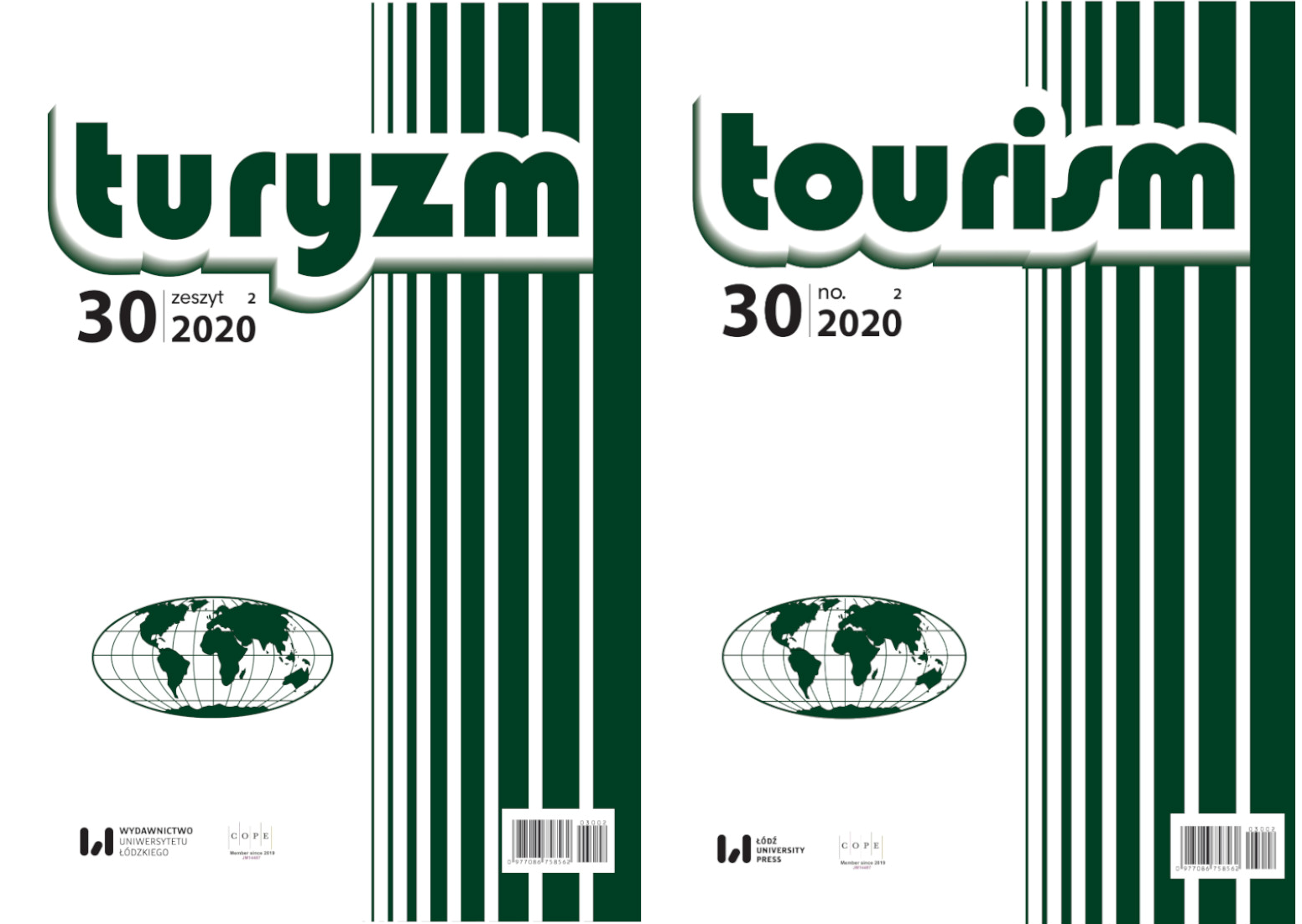Customer satisfaction in Slovak spas: Case studies of Rajecké Teplice, Piešťany and Brusno
DOI:
https://doi.org/10.18778/0867-5856.30.2.24Słowa kluczowe:
Rajecké Teplice spa, Piešťany spa, Brusno spa, customer satisfaction, elements of customer satisfactionAbstrakt
This work aims to present a customer satisfaction model using selected examples from the spa industry. Specifically, it is a presentation of the satisfaction of spa customers and visitors to the Slovak spa of Rajecké Teplice, in comparison with Piešťany and Brusno. Customer satisfaction is a multiple phenomenon which is evaluated mainly by qualitative methods. Our motivation is to draw attention to the difficulty and subjectivity of qualitative research concerning such satisfaction, especially at in-service facilities in selected Slovak spas. Customers ranked them and created a ‘top 12’, according to their importance in the subjective perception of spa environments, services, health services and attractions in terms of satisfaction. In addition, the result is a comparison of the individual satisfaction of spa customers in heterogeneous spa towns. Piešťany is the most important Slovak spa center, Trenčianske Teplice is a medium-sized spa town, and Brusno a small stagnant spa.
Pobrania
Bibliografia
Angrosino, M. (2010). Badania etnograficzne i obserwacyjne. Warsaw: Wydawnictwo Naukowe PWN.
Google Scholar
Beach, L.R., Connolly, T. (2005). The psychology of decision making. People in organizations. London: Sage.
Google Scholar
Bel, M. (1735). Notitia Hungariae novae historico geographica. Wiedeń: Pavol Straub.
Google Scholar
Čuka, P. (2004). Kúpeľníctvo a cestovný ruch. In: P. Hronček, A. Choma, L. Chomová, N. Polčák, O. Tomeček (eds), Monografia obce Svätý Ondrej nad Hronom-Brusno (pp. 79-87). Brusno: Obec Brusno.
Google Scholar
Čuka, P. (2017). Geography of turism of Slovakia. In: K. Widawski, J. Wyrzykowski (eds), The geography of tourism of Central and Eastern European countries (pp. 437-467). Springer: Cham. DOI: https://doi.org/10.1007/978-3-319-42205-3_11
Google Scholar
DOI: https://doi.org/10.1007/978-3-319-42205-3_11
Čuka, P., Matušíková, D., Šenková, A. (2013). Thermal parks in Slovakia: Function, analysis, regionalization. In: M. Dej, M. Huculak, W. Jarczewski (eds), Recreational use of geothermal water in Visegrád group countries (pp. 150-184). Cracow: Institute of Urban Develompent.
Google Scholar
Dôvera zverejnila prvý rebríček kúpeľov (2009). Retrieved from: https://www.zdravie.sk/clanok/38398/dovera-zverejnila-prvy-rebricek-kupelov (1.08.2020).
Google Scholar
Evans, J.St.B.T. (1982). The psychology of the deductive reasoning. London: Routledge & Kegan Paul.
Google Scholar
Evans, J.St.B.T. (2004). Biases in deductive reasoning. In: R.F. Pohl (ed.), Cognitive illusions. A handbook of fallacies and biases in thinking, judgement and memory (pp. 127-144). New York: Psychology press.
Google Scholar
Foster, T. (2002). Jak získat a udržet zákazníka. Brno: Computer Press.
Google Scholar
Glimcher, P.W., Camerer, P.F., Fehr, E., Poldrack, R.A. (eds) (2008). Neuroeconomics. Decision making and the brain. New York: Academic Press.
Google Scholar
Gregorová, B. (2010). Analýza vybraných faktorov ovplyvňujúcich vznik a rozvoj cestovného ruchu v Nízkych Tatrách. Geographia Cassoviensis, 4 (1), 53-56.
Google Scholar
Heksch, A.F. (1881). Führer durch die Karpathen und Oberungarischen Badeorte. Vienna: Hartleben.
Google Scholar
Hodnotenie klientov (2019). Retrieved from: http://www.kupeleslovenska.sk/hotel-aphrodite-palace/rajecke-teplice/h55 (13.07.2020).
Google Scholar
Hotel Aphrodite (2019). Retrieved from: https://www.booking.com/hotel/sk/aphrodite.sk.html (2.08.2020).
Google Scholar
Hydrologické a fenologické pomery ČSSR (III) (1970). Prague: HMÚ.
Google Scholar
Kúpele Brusno a.s. (2018). Retrieved from: https://www.finstat.sk/31642314 (15.07.2020).
Google Scholar
Kúpele Piešťany a.s. (2018). Retrieved from: https://www.finstat.sk/34144790 (13.09.2020).
Google Scholar
Maria M – Hotel Rubín (2019). Retrieved from: https://www.kupeledudince.sk/references (12.07.2020).
Google Scholar
Nagyová, P. (2009). Retrieved from: https://dennik.hnonline.sk/slovensko/209342-rebricek-kupelov-boduje-stred-slovenska (12.09.2020).
Google Scholar
Najlepšie hodnotené kúpele na Slovensku (2019). Retrieved from: https://www.sorger.sk/kupele?sort=reviewsm (2.09.2020).
Google Scholar
Nilson, P., Mariott, L. (2017). Be a player. A breakthrough approach to playing better on the golf course. London: Atria Books.
Google Scholar
Przecławski, K. (1996). Człowiek a turystyka. Zarys socjologii turystyki. Cracow: ALBIS.
Google Scholar
Rajecké Teplice liečebný pobyt (2019). Retrieved from: http://www.kupeleslovenska.sk/preventivny-liecebny-balik/rajecke-teplice/p7306 (13.07.2020).
Google Scholar
Referencie hostí (2019). Retrieved from: https://www.kupeledudince.sk/references (20.07.2020).
Google Scholar
Rudnicki, L. (2015). Wpływ produktu turystycznego na zachowania rynkowe konsumentów. Zeszyty Naukowe Małopolskiej Wyższej Szkoły Ekonomicznej w Tarnowie, 26 (1), 121-128.
Google Scholar
Slovenské liečebné kúpele Rajecké Teplice a.s. (2018). Retrieved from: https://www.finstat.sk/31642284 (25.07.2020).
Google Scholar
Szwarc, P. (2005). Research customer satisfaction & loyalty: How to find out what people really think. London–Philadelphia: Kogan Page Limited.
Google Scholar
Szymańska, B. (2013). Satysfakcja komercyjnego klienta usług sanatoryjnych w Polsce. In: W. Grzegorczyk (ed.), Marketing w obliczu nowych wyzwań rynkowych. Księga jubileuszowa z okazji 70-lecia Profesora Gregora (pp. 229-242). Łódź: Wydawnictwo Uniwersytetu Łódzkiego. DOI: https://doi.org/10.18778/7969-046-6.19
Google Scholar
DOI: https://doi.org/10.18778/7969-046-6.19
Tatrabanka používa AI technológiu (2017). Retrieved from: https://www.tatrabanka.sk/sk/blog/tlacove-spravy/tatra-banka-pouziva-ai-technologiu-ktora-rozpozna-spokojnost-klienta/ (27.05.2020).
Google Scholar
Walas, B. (2018). Badanie satysfakcji kuracjuszy uzdrowiska Rabka-Zdrój metodą Kano. Biuletyn Przestrzennego Zagospodarowania Kraju Polskiej Akademii Nauk, 269, 143-156.
Google Scholar
Pobrania
Opublikowane
Jak cytować
Numer
Dział
Licencja

Utwór dostępny jest na licencji Creative Commons Uznanie autorstwa – Użycie niekomercyjne – Bez utworów zależnych 4.0 Międzynarodowe.










